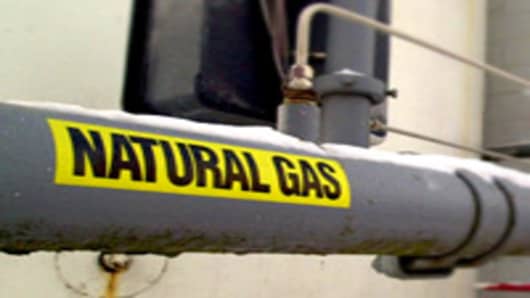Sizzling hot temperatures around the country are driving up natural gas and electricity demand, with air-conditioners and generators in overdrive in the 100-plus degree heat.
But futures traders, who didn't bet on this intense heat a week ago, missed the wave.
The weather's impact on commodities like natural gas and electricity has cooled off considerably in the past few days. Commodities traders trade the weather by looking ahead six to 10 days — or even further — in anticipation of weather patterns to come and place their bets accordingly.
Nowhere is this more apparent than in natural gas prices. August natural gas futures surged nearly 50 cents or about 7 percent in about seven sessions, reaching a one-month high Monday just over $4.60 per million British Thermal Units. That surge in futures prices came ahead of the extreme heat based on forecasts calling for triple-digit heat in much of the country at the end of this week.
Today (Thursday), weather forecasts looking ahead six to 10 days see these intense temperatures tapering off.
"It's still going to be warm, but not as extreme. The heat is going to abate and we'll see some relief in the second half of next week," says WSI energy economist Dan Leonard.
So while wholesale prices on the New York cash market surged to a five-month high Wednesday, reflecting current temperatures, natural gas futures (based on longer-term weather forecasts) have lost their upward momentum.
Another catalyst for Thursday's slide in natural gas futures: an increase in weekly storage figures that was largely in-line with estimates. After a "sell the news" reaction to the data, traders are "now able to focus more on what will be a moderate cooling trend into next week as the most intense heat moves off the East Coast over the weekend," says Citi Futures Perspective energy analyst Tim Evans.
Meanwhile, electricity consumption has been soaring as the heat wave continues to prompt millions to crank up air conditioners. Electricity futures rallied 8 percent last week on the forecast for extreme temperatures, but have since cooled off 2 percent this week. According to Platts, even though wholesale power prices have climbed with the high temperatures, those prices have actually remained relatively low given the degree of the extreme weather.
The good news is, according to Platts, most residential consumers will not see the increase in natural gas and power prices since utilities pass on the cost of buying electricity during a heat wave across a longer period of time. An increase in an individual consumer bill this month would only come from increased usage and not an increase in base prices.
Questions? Comments? Email us at marketinsider@cnbc.com



